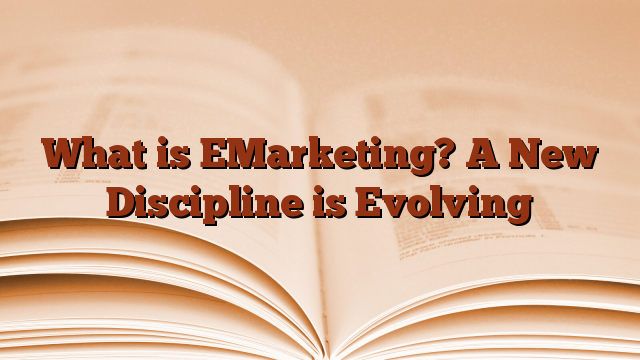Before we attempt to define the term eMarketing (or electronic marketing, so to speak), we should first take a look at the premises of its origin and development.
The theories on the subject of eMarketing are not yet unified, since the opinions of specialists are very different. However, one of the aspects that is established and no longer controversially discussed is the fact that e-marketing first appeared in the form of various techniques used by companies selling their products through online (Internet-based) channels. This happened in the pioneering days before 1995. These pioneering companies were referred to as “e-tailers” as opposed to the traditional retailers (aka “brick-and-mortar” retailers). During their limited lifespan, these electronic retailers began to develop and introduce new marketing techniques based on the support of the Internet.
The above mentioned online technologies developed in the context of the e-tailers are widely used by B2C and B2B organizations nowadays. In other words, they’ve evolved into what we now call eMarketing (you can spell it e-Marketing if you like, the “e-” stands for “electronic” in both cases).
You might find the perspective offered by the eMarketing Association (eMA) extremely useful and stimulating. Much has been heard about the decline of online businesses (or dotcoms) especially in the last 2 years, but this temporary difficulty can be seen as a resemblance to Columbus’ impasse during his expedition that made him more than famous did half a millennium ago. The initial “business plan” Columbus used to begin this voyage (to bring the Asian resources to his country and become fabulously rich) was a complete disaster: disastrous estimates, under-allocated resources, complete lack of information about the environment, the he will develop his “business” in, but… he instead discovered America and changed the world forever. Similarly, we can say that the dot-coms, despite their terrible strategies (if any), have “discovered” the world of eMarketing.
As we have already noted, the definition of eMarketing is still very problematic. But what do we mean when we use this term? Like many other English words, the term came about by adding the prefix “e-” to a term already known and used, in this case “marketing”. The prefix “e-” is actually the extreme contraction of the word “electronic” and is quite ubiquitous in the language of many people today: “e-marketing”, “e-business”, “e-mail”, “e-learning” . “, “e-commerce”, “e-“, “e-“, “e-“…
The simplest definition of eMarketing might be the one suggested by Mark Sceats: eMarketing using the internet as a channel of manifestation.
A broader, more practical definition was formulated by specialists from the CISCO company: eMarketing is a general term used for a wide range of activities – advertising, customer communication, branding, loyalty programs, etc. – that use the Internet. More than simply developing a website, eMarketing focuses on online communication, direct dialogue with consumers who are so involved in the development of new products, finding efficient methods to win customer loyalty and facilitate their business process . eMarketing is the sum of the activities a company undertakes with the aim of finding, attracting, acquiring and retaining customers.
Finally, for those of you interested in a more scientific approach, we can say that eMarketing enables relational exchanges in digital, connected and interactive environments (acronym: DNI environments). Earlier in the history of eMarketing it was conceived to focus on exchange, but today’s theorists propose that the exchange paradigm is a limited modality to define eMarketing.
Which definition you choose depends on where exactly you need to use it and for what purpose. You can probably come up with a definition yourself based on your own knowledge, experience and views of what eMarketing is.
However, a conclusion must be drawn in connection with eMarketing: In recent years it has developed into an independent discipline, with its own terminology, tools and laws, but with knowledge that still needs to be systematized.
Thanks to Otilia Otlacan | #EMarketing #Discipline #Evolving

Leave a Reply